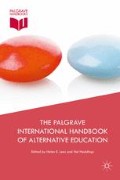Abstract
People have expressed ambivalence about education and schools for a long time. On the one hand, it is believed that a good education should produce better people, better in every aspect of human life: intellectual, moral, physical, social, vocational, aesthetic, spiritual and civic. On the other hand, we know that schools have often induced fear, boredom, subjugation and feelings of inadequacy among those being educated. Fifty years ago, Ivan Illich (1971) suggested that, if we want to enjoy the true promise of education, we must find alternative ways to educate; we should “deschool” our society.
Access this chapter
Tax calculation will be finalised at checkout
Purchases are for personal use only
References
Cremin, L. (1961). The transformation of the school: Progressivism in American education. New York: Knopf.
Darling, J. (1994). Child centrered education and its critics. London: Paul Chapman Publishing Ltd.
Dewey, J. (1916). Democracy and education. New York: Macmillan.
Dewey, J. (1929). The quest for certainty: A study of the relation of knowledge and action. The Gifford lectures 1928-1929. London: George Allen and Unwin Ltd.
Hase, S., & Kenyon, C. (2007). Heutagogy: A child of complexity theory. Complicity: An International Journal of Complexity and Education, 4(1), 111–118.
Illich, I. (1971). Deschooling society. New York: Harper & Row.
Lyotard, J.-F. (1984). The postmodern condition: A report on knowledge (G. Bennington & B. Massumi, Trans.). Manchester, UK: Manchester University Press.
Melser, D. (2004). The act of thinking. Cambridge, MA: The MIT Press.
Röhrs, H., & Lenhart, V. (Eds.). (1995). Progressive education across the continents. Frankfurt am Main: Peter Lang.
Skidelsky, R. (1969). English progressive schools. Harmondsworth: Penguin.
Stewart, W. A. C. (1972). The educational innovators Vol. 2: Progressive schools 1881–1967. London: Macmillan.
Wilson, E. O. (2006). The creation: An appeal to save life on earth. New York: Norton.
Author information
Authors and Affiliations
Corresponding author
Editor information
Editors and Affiliations
Copyright information
© 2016 The Author(s)
About this chapter
Cite this chapter
Noddings, N., Lees, H.E. (2016). Introduction & This Handbook . In: Lees, H., Noddings, N. (eds) The Palgrave International Handbook of Alternative Education. Palgrave Macmillan, London. https://doi.org/10.1057/978-1-137-41291-1_1
Download citation
DOI: https://doi.org/10.1057/978-1-137-41291-1_1
Published:
Publisher Name: Palgrave Macmillan, London
Print ISBN: 978-1-137-41290-4
Online ISBN: 978-1-137-41291-1
eBook Packages: EducationEducation (R0)

